|
  
- UID
- 12794
- 帖子
- 8835
- 积分
- 11329
- 学分
- 56097 个
- 金币
- 800 个
- 在线时间
- 826 小时

|
|
Houston (U.S.) |  The fourth-largest city in the US is a sprawling metropolis of highrises(高楼大厦), malls and parking lots(停车场). Hot, humid and flat, Houston may not be Texas' premier destination, but it has much to offer, including great museums, beautiful parks, a hip young population and a variety of excellent excursions. The fourth-largest city in the US is a sprawling metropolis of highrises(高楼大厦), malls and parking lots(停车场). Hot, humid and flat, Houston may not be Texas' premier destination, but it has much to offer, including great museums, beautiful parks, a hip young population and a variety of excellent excursions.
The days when cows and oilmen(石油商)roamed the streets of Houston are long gone. Houston dominates southeastern Texas, thanks to a historic commitment to growth typical of the Lone Star state(得克萨斯州的别名), characterized by a lack of zoning and other planning restrictions, resulting in a sprawling, confusing city.
Downtown Houston, the original business center, is a thicket of highrises interspersed(散布)with parking lots, ringed by elevated freeways. The streets can seem surprisingly empty during the day, with nary a pedestrian(一个行人也没有)to be found braving the hot and shimmering sidewalks. But the people are there. In a variation of a post-apocalyptic(后世界末日)nightmare, most downtown buildings are linked by air-conditioned underground pedestrian tunnels lined with shops and restaurants. After dark, the area is sparsely populated above and below ground, though some life can be found around the new baseball stadium and in the north end's nightclub district. Major neighborhoods include Houston Heights, an affluent, quiet residential area north of downtown, overlooking the Buffalo Bayou(布法罗湾); Montrose, the center of Houston's gay scene, with a funky mix of shops, restaurants, galleries and tattoo parlors a few blocks southwest of downtown.
Houston got its start in 1836, when brothers Augustus and John Allen set up a trading post on the Buffalo Bayou, a river that now meanders(蜿蜒)through the heart of the city. The Allens named their new holding Houston in honor of General Sam Houston, who had just defeated the Mexican Army at San Jacinto. The coming of the railroad boosted the economy in the 1860s and 1870s, but the real prosperity was still around the corner.
It was the 1901 discovery of oil at nearby Spindletop that put Houston on the road to riches. The city's only obstacle to growth was its sweltering(闷热的)summer heat, but beginning in the 1930s, the widespread availability of air conditioning made massive downtown development a reality.
Beginning in the 1950s, downtown underwent wave after wave of skyscraper construction. Hand in hand with the building boom was a craze to raze: dozens of older commercial and residential buildings were leveled and turned into parking lots for the growing army of office workers. NASA's Mission Control Center opened a few miles from Houston in 1963, and six years later the city's name became the first word ever spoken by a human being on the surface of the moon.
Throughout the 1970s, Houston's fortunes continued skyward(向上的). When oil reached a barrel in 1981, Houston was awash in money as scores of happy Texans got rich quick; four years later, the price of oil plummeted(直线下降)to single digits and Houstonians got poor even faster. Glitzy(耀眼的,炫目的)but empty highrises stood next to giant construction holes that had to be filled back in when the financing ran out.
In the 1990s, Houston's economy diversified as the city rode the general economic boom that swept the US. In 1997, Houston elected its first black mayor, Lee Brown. The following year, Houston was drenched by a torrential downpour and menaced by tornadoes. The floodwaters were strong enough to sweep houses off their foundations. Several people were killed and large areas of the city remained under water for days.
|
|
|